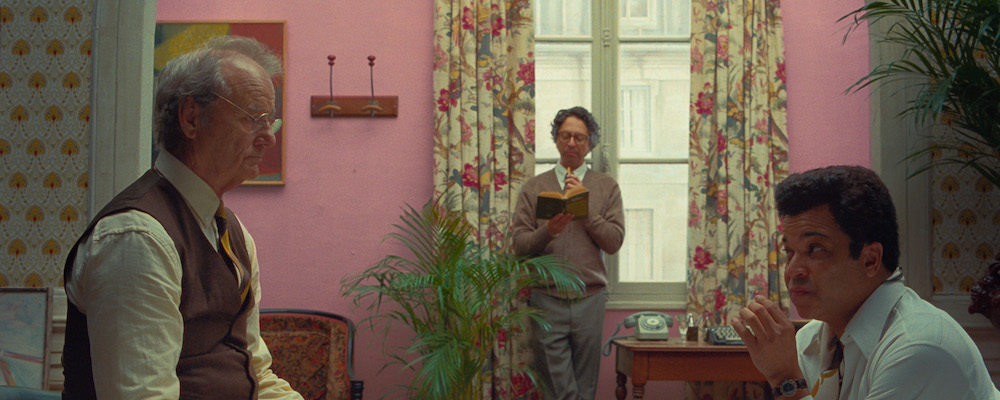Wes Anderson Transports Us to France in Escapist Love Letter ‘The French Dispatch’
Sandra Miska
Wes Anderson heads to provincial France in his latest feature, “The French Dispatch.” A love letter to the New Yorker, ostensibly the focus is on a group of American journalists working in a fictional French town, Ennui-sur-Blasé. Those employed at the French Dispatch magazine work at a leisurely pace, churning out mostly lifestyle and human interest pieces. The film brings to life three of the publications most memorable articles during the magazine’s 50-year publication, and Anderson outdoes himself with his colorful assortment of characters, not just the writers but also their subjects. It presents three absorbing stories, plus a frame story set in the newsroom.
“The French Dispatch” begins with the passing of its editor, Arthur Howitzer Jr. (Bill Murray). Arthur escaped from Middle America a half a century earlier, settling in Ennui-sur-Blasé and starting the magazine, a supplement to his father’s paper, the Liberty, Kansas Evening Star. Although Arthur is based on the New Yorker founder Harold Ross and the French Dispatch articles seem to be on par with those one would read in that magazine, we’re told that the Dispatch is a little-read publication inserted in the Sunday issue of the Liberty. The three stories featured bring to life and humanize people often found on the fringes of society. The first story, “The Concrete Masterpiece,” told by art critic J.K.L. Berensen (Tilda Swinton), follows a convicted murderer, Moses Rosenthaler (Benicio del Toro), whose abstract nude portrait of his lover, Simone (Léa Seydoux), a prison guard who lifted herself out of poverty, gets him discovered by a white-collar criminal, fellow inmate, Julian Cadazio (Adrien Brody). Upon his release, Julian, with help from his rich uncles (Henry Winkler, Bob Balaban), makes Moses an art world star, but despite being stuck in prison, he takes his sweet time creating his follow-up work.
The second story, “Revisions to a Manifesto,” feels the most epic and timely. Frances McDormand stars as Lucinda Krementz, an unmarried writer who resists her friends’ (Cécile de France, Guillaume Gallienne) attempt to set her up with an art collector (Christoph Waltz), and instead has an affair with their college student son, Zeffirelli (Timothée Chalamet). But the story is really about this young man and his classmates seeking to make their voices heard, and the student revolution they start aims to change things from an archaic rule in the girls’ dorm that bans male visitors, to policy concerning the military. McDormand and Chalamet have a charming chemistry as they navigate a sweet but awkward relationship that sees the straightforward Lucinda serving as a writing mentor to her idealistic young lover, proofreading and polishing his manifesto.
Finally, the third story, “The Private Dining Room of the Police Commissioner,” is the most ambitious of the three. Food writer Roebuck Wright (the always outstanding Jeffrey Wright, who proves to be the MVP of an already impressive ensemble cast) recalls to a talk show host (Liev Schreiber) his most memorable article, a piece that started off as a profile of an immigrant chef/cop (Stephen Park) who works in a prison, turns into something else when the dinner Roebuck attends at the precinct is interrupted when the son (Winston Ait Hellal) of the police commissioner (Mathieu Amalric) is kidnapped. This chapter contains car crashes and the like, but Anderson isn’t really an action director. However, he finds a way to stay true to his vision (and save money) by using animation.
“The French Dispatch” is peak Anderson, packed full of his signature visual touches, such as fanciful title cards, twee props, and tableaux vivants. One cannot help but admire the auteur’s intense attention to detail, particularly when it comes to his mise-en-scène, although it sometimes feels overloaded as the viewer takes in certain quick shots before the camera pans. But the heart of his films are the human relationships, and it is often the quieter, one-on-one scenes that stand out. While there are less of these quieter scenes here than in earlier films like “Rushmore” and “The Royal Tenenbaums,” there’s still plenty of heart. The camaraderie among the staff at the Dispatch is not unlike that shared by the crew members in “The Life Aquatic with Steve Zissou.”
Overall, “The French Dispatch” is an enjoyable, escapist watch. The marvelous cast includes past Anderson collaborators such as Owen Wilson as a travel writer, Jason Schwartzman as an illustrator, Anjelica Huston as the narrator, and Edward Norton and Saoirse Ronan as members of the underworld. There are also some first-timers, such as Elisabeth Moss, who gives her all in a smaller part as a copy editor, and gifted rising actress Lyna Khoudri as a radical college student who finds herself competing with Lucinda for Zeffirelli.
“The French Dispatch” releases Oct. 22 in select theaters.

